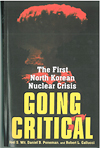Political Integration and Identity
Research:Seminars/Workshops
The 3rd Meeting of Political Integration Group, “Explaining ‘Long Peace’ in Asia”
2010.03.02
- Members
- Chikako (Kawakatsu) Ueki (Professor, Waseda University)
- Kim Yu-Eun (Professor, Hanyang University)
- Hiro Katsumata (Assistant Professor, Waseda University)
- Masato Kamikubo (Assistant Professor, Waseda University)
- Miki Honda (Assistant Professor, Waseda University)
- Christian Wirth (GIARI, RA)
- Takeshi Odaira (GIARI, RA)
- Amin Bin Baki (GIARI, RA)
- Lee Seung-Je (GSAPS student, Waseda University)
- Title:
The 3rd Meeting of Political Integration Group, GIARI
“Explaining ‘Long Peace’ in Asia” - Date/Time:
Tuesday, March 2
10:30-14:10 - Venue:
Bldg.19, 7F#501, Waseda-Campus, Waseda University
Summary

The 3rd meeting of the political team had a group reading of Going Critical: The First North Korean Nuclear Crisis (Brookings Institution, 2005) written by Joel S. Wit, Daniel B. Poneman, and Robert L. Gallucci to grasp the whole picture of the nuclear crisis in 1994. Each member of the group made a presentation and analyzed each chapter of the book, respectively, focusing on the behavior of actors (or agents) involved. The group tried to understand reasons why North Korean, the US and South Korea finally refrained from opening war in 1994 despite their highly tensed relationship due to the allegation of North Korea's nuclear program. Some important suggestions were found through the group reading. The both sides — North Korean side and US-South Korean side — stood on the edge of war and the US and South Korea had actually prepared for war, however, they decided not to go into warfare. This is the result of their rational decision after analyzing the war cost; financial burden and huge human loss. At the brink, the logic of deterrence worked well. And in this case, the third actors such as the former US President Jimmy Carter and IAEA, the United Nations played key roles to avoid war.
